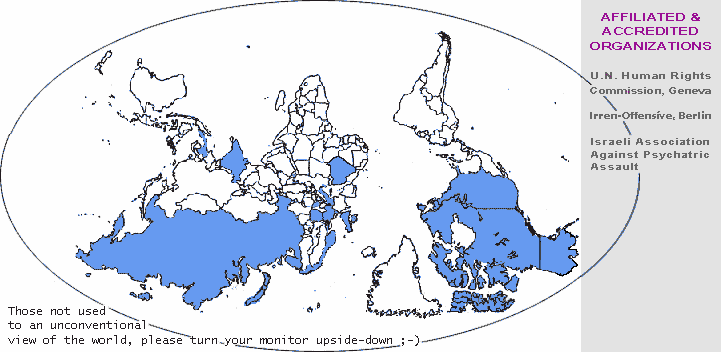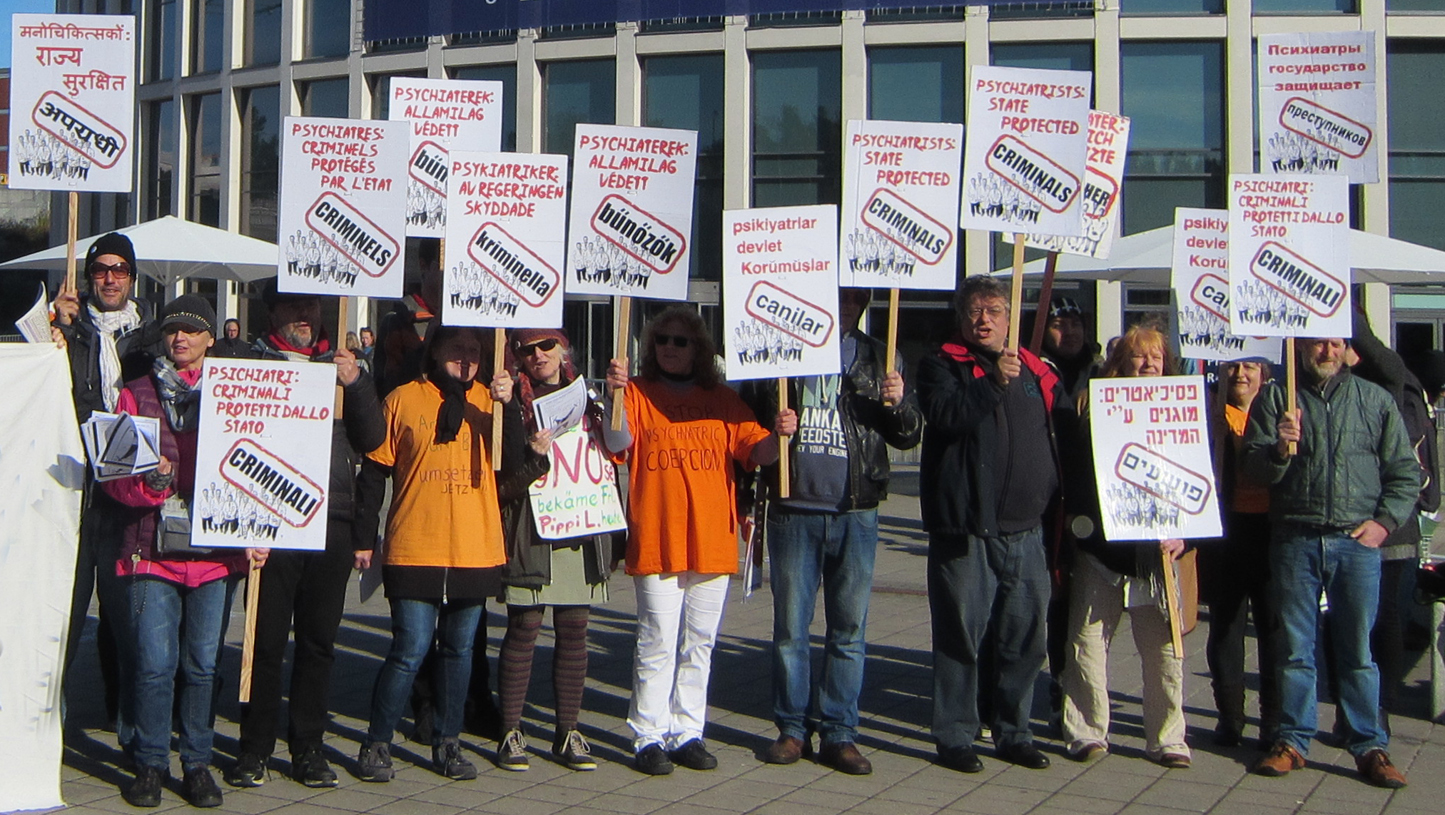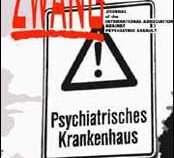International Association Against Psychiatric Assault
c/o Lawyer/Rechtsanwalt André Raeber, Hinterbergstrasse 24, 6312 Steinhausen, Schweiz/SwitzerlandThe association is a Human Rights organization that opposes psychiatric coercion and aims to abolish psychiatric coercive measures altogether, promoting the fundamental rights of self-determination, liberty, and human dignity.
IAAPA is not only “radical” in its aims, …

… it also has a true democratic “revolutionary” form: the General Assemblies take place legally via the internet and thereby completely save travel expenses for our members.
In this way members from poor countries and poor members from rich ones can participate in the decision making process without the need to depend on doctors’ associations, pharmaceutical sponsors or the state for reimbursing their travel costs.
PRINZHORN: 100 years since his book (9.2.2022)
How a psychiatrist’s reaction to the Dada exhibitions in the First World War led to the Nazis’ medically based mass murders in the Second World War.
The true story of the infamous “Prinzhorn” collection at the Heidelberg University and the purpose it served.
For an English print version of ZWANG No. 1, please mail your postal address to our Secretary:

Blue marks the countries where we currently have members:
Algeria, Belgium, Canada, Cyprus, Germany, Great Britain, Hungary, India, Ireland, Israel, Italy, Norway, Poland, Russia, Switzerland, Thailand, USA
Organizational Agenda
IAAPA Secretariat: Vorbergstr. 9a, 10823 Berlin, Germany
Members of the executive committee:
- – Webmaster: Hagai Aviel, 79/2 Ibn Gvirol, 64046 Tel Aviv, Israel
- – Secretary: René Talbot – r.talbot[at]berlin.de
- – IAAPA U.N. Representative: Peter Zihlmann, Spechtweg 1, 4125 Riehen, Switzerland
Date and time of next General Assembly (G.A.):
- Tuesday, 24th February 2026 at 16.00 GMT (your local time?)

Please read our magazine flyer with a call for protest
against the WPA congress in Berlin, October 2017.
Pictures of the protest see here, a report by “die-BPE” see here.

The UN High Commissioner for Human Rights acceptetd our demand put forth in our statutes article 2.(B) h. to abolich the UN resolution 46/119 of December 17, 1991 on the treatment of “mental patients”: In a report to the General assembly of UN of “on enhancing awareness and understanding of the Convention on the Rights of Persons with Disabilities” the High Commissioner definitly states, that
The Insanity defense “must be abolished” (see Article 47 below)
and that the “Convention radically departs ” from the UN resolution …on treatment of “mental patients” (see Article 48 below)
that all mental health laws using the pretex “as the likelihood of them posing a danger to themselves or others” “must be abolished” (see Article 49 below)
“47. In the area of criminal law, recognition of the legal capacity of persons with disabilities requires abolishing a defence based on the negation of criminal responsibility because of the existence of a mental or intellectual disability.41 Instead disability-neutral doctrines on the subjective element of the crime should be applied, which take into consideration the situation of the individual defendant. Procedural accommodations both during the pretrial and trial phase of the proceedings might be required in accordance with article 13 of the Convention, and implementing norms must be adopted.5. Right to liberty and security of the person
48. A particular challenge in the context of promoting and protecting the right to liberty and security of persons with disabilities is the legislation and practice related to health care and more specifically to institutionalization without the free and informed consent of the person concerned (also often referred to as involuntary or compulsory institutionalization). Prior to the entrance into force of the Convention, the existence of a mental disability represented a lawful ground for deprivation of liberty and detention under international human rights law.42 The Convention radically departs from this approach by forbidding deprivation of liberty based on the existence of any disability, including mental or intellectual, as discriminatory. Article 14, paragraph 1 (b), of the Convention unambiguously states that “the existence of a disability shall in no case justify a deprivation of liberty”. Proposals made during the drafting of the Convention to limit the prohibition of detention to cases “solely” determined by disability were rejected.43 As a result, unlawful detention encompasses situations where the deprivation of liberty is grounded in the combination between a mental or intellectual disability and other elements such as dangerousness, or care and treatment. Since such measures are partly justified by the person’s disability, they are to be considered discriminatory and in violation of the prohibition of deprivation of liberty on the grounds of disability, and the right to liberty on an equal basis with others prescribed by article 14.
49. Legislation authorizing the institutionalization of persons with disabilities on the grounds of their disability without their free and informed consent must be abolished. This must include the repeal of provisions authorizing institutionalization of persons with disabilities for their care and treatment without their free and informed consent, as well as provisions authorizing the preventive detention of persons with disabilities on grounds such as the likelihood of them posing a danger to themselves or others, in all cases in which such grounds of care, treatment and public security are linked in legislation to an apparent or diagnosed mental illness….
41 Often referred to as “insanity defence”.
42 See for reference the Principles for the Protection of Persons with Mental Illness and the Improvement of Mental Health Care, A/RES/46/119, available at: http://www.un.org/documents/ga/res/46/a46r119.htm.43 In the course of the third session of the Ad Hoc Committee on a Comprehensive and Integral International Convention on the Protection and Promotion of the Rights and Dignity of Persons with Disabilities, proposals were made to add the word “solely” to then draft article 10, paragraph 1 (b), so it would read “any deprivation of liberty shall be in conformity with the law and in no case shall be based solely on disability.
The report in English | French | Russian | Spanish | Chinese | Arabic
Deception failed
Statement the German Association: Bundesarbeitsgemeinschaft Psychiatrie-Erfahrener on the ratification of the Convention on the Rights of Persons with Disabilities in Germany.
Neo-Nazi Eugenics
Many anti-fascists turn a blind eye?
On the one hand it is shown in the article with which ideology the systematic gas chamber mass murder, which began in 1939 in the psychiatric institutions, was justified. On the other hand the aim is to explain why it has so far been completely ignored that only a few letters were changed in order to relabel the ideology and now in October 2012 in Hamburg, a “World Congress of Psychiatric Genetics” can be organized.
(Article first published in print in the Grasrootrevolution 4/2012)
im Jüdischen Museum in Berlin
und
dem Hygiene Museum in Dresden
in the Jewish Museum/Berlin
and
the Hygiene Museum/Dresden
Resolutions
- 8 demands as to how the memory of the victims and the perpetrators of the systematic medical mass murder from 1939 to 1949 should be handled. (Resolution Point # 1 of the G.A. of February 17, 2009)
- IAAPA is establishing an “international claim list” linked to the IAAPA Homepage
- The IAAPA Webmaster is responsible for this. (Resolution Point # 5 of the G.A. of Jan. 28, 2003)
- German state archive publishes 30,000 names of the systematic medical mass murder victims 1939-41 (Resolution Point # 3 of the G.A. of Sept. 18, 2018)
- Day of remembrance and resistance should be on May 2nd (Resolution Point # 4 of the G.A. of March 11, 2003)
- Disabled by Psychiatry and the Law (Resolution Point # 2 of the G.A. of July 29, 2003
- Call for Action: mass mental health screening, a forced diagnose of the whole population implemented legally in Illinois, USA (Resolution Point # 1 of the G.A. of June 28, 2005)
- Call to protest against the falsification of history in the Hygiene Museum and the denial of over 20 000 murder victims from 1945-49 (Resolution Point # 1 of the G.A. of Septemer 26, 2006) In Italiano
Our letter to the High Commissioner for Human Rights, Mrs. Navanethem Pillay
RESULTS OF THE CONTEST for the best title for a particular photo.










